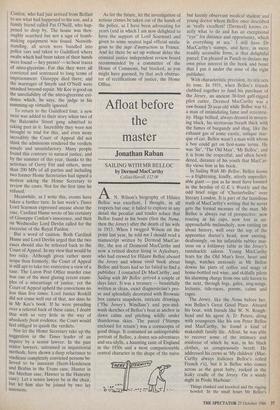Afloat before the master
Jonathan Raban
SAILING WITH MR BELLOC by Dermod MacCarthy CollinslHarvill, £12.00 A. N. Wilson's biography of Hilaire Belloc was excellent, I thought, in all respects but one: it failed to explore in any detail the peculiar and tender solace that Belloc found in his boats (first the Nona, then the Jersey) after the death of his wife in 1913. When I twigged Wilson cid the point last year, he told me I should read a manuscript written by Dermod MacCar- thy, the son of Desmond MacCarthy and now a retired doctor living in Aylesbury, who had crewed for Hilaire Belloc aboard the Jersey and whose vivid book about • Belloc and boats had so far failed to find a publisher. I contacted Dr MacCarthy, and Sailing with Mr Belloc arrived a couple of days later. It was a treasure — beautifully written in clean, exact diagnostician's pro- se and splendidly decorated with Brownie box camera snapshots, intricate drawings (`The Jersey's Windlass') and pen-and- wash sketches of Belloc's boat at anchor in dawn calms and pitching wildly under thunderous skies. The parcel ('Stamps enclosed for return') was a cornucopia of good things. It contained an unforgettable portrait of Belloc, a dozen sea-adventures and sea-idylls, a haunting taste of England in the 1930s and a most companionable central character in the shape of the naive
but keenly observant medical student and young doctor whom Belloc once described as 'really excellent! (Dermod) knows ex- actly what to do and has an exceptional "eye" for distance and opportunity, which is everything at sea.' I still have Dr MacCarthy's stamps, and here, in more readily accessible form, is that delightful parcel: I'm pleased as Punch to declare my own prior interest in the book and boast that I put it under the nose of the right publisher.
With characteristic precision, its title sets its tone. In 1931, when Belloc's friends clubbed together to fund his purchase of the Jersey, an ancient 38-foot gaff-rigged pilot cutter, Dermod MacCarthy was a raw-boned 20-year-old while Belloc was 61, a man of intimidating fame and eccentric- ity. Huge bellied, always dressed in mourn- ing black, his stertorous breath thick with the fumes of burgundy and shag, like the exhaust gas of some exotic, antique mar- que of car, Belloc wasn't a man with whom a boy could get on first-name terms. He was 'Sir', 'The Old Man', 'Mr Belloc'; and it is from the respectful, and often bewil- dered, distance of his youth that MacCar- thy views him in his book.
In Sailing With Mr Belloc, Belloc looms — a frightening, kindly, utterly unpredict- able giant — just as he must have loomed in the heyday of G. K. 's Weekly and the odd brief reign of `Chesterbelloc' over literary London. It is part of the fastidious truth of MacCarthy's writing that he never gets the formal measure of the man. Mr Belloc is always out of perspective: now roaring in his cups, now lost in un- approachable melancholy, now rattling on about history, well over the top of the apprentice doctor's head, now snoring, deafeningly, on his inflatable rubber mat- tress on a foldaway table in the Jersey's ramshackle saloon. Young MacCarthy fears for the Old Man's liver, heart and lungs, watches anxiously as Mr Belloc downs his pints of coffee and mugs of home-bottled red wine, and skilfully pilots his alarming charge from one safe haven to the next, through fogs, gales, sing-songs, lectures, tide-races, poems, calms and rages.
The Jersey, like the Nona before her, was Belloc's Great Good Place. Aboard his boat, with friends like W. N. Rough- head and his agent A. D. Peters, along with youngsters like his son Peter Belloc and MacCarthy, he found a kind of makeshift family life. Afloat, he was able to recover some of the intimacy and tendresse of which he was, in his black clothes, so conspicuously bereft. He addressed his crews as 'My children' (Mac- Carthy always italicises Belloc's rolled French r's), but it is Belloc who comes across as the great baby, rocked in the leaky cradle of the Jersey. On a windy night in Poole Harbour:
Things clanked and knocked and the rigging howled. In the small hours Mr Belloc's high-pitched sighs began again, very unhap- py, suffering sounds. In an instant Peter was by his berth and asking 'What is it, Papa!' I can't sleep, my dear, I'm cold."Yes, yes, Papa, I'll see to it.' Peter covered him with a lot more blankets and tucked them warmly round him like a child, Mr Belloc saying all the time 'Thank you, thank you. Thank you, darling boy.'
He loved the infantile release of bawdy. 'He sang rather quietly, amusing himself on and on, mostly at tenor pitch', such songs as:
First we heard a scuffle Then we heard a shout And then we found Eliza With her entrails hanging out . . .
At sea, parked vinously in the scuppers, or down in the masculine hugger-mugger of the cabin, Belloc could sing, and say, endearingly childish things; an old and lonely man returning to the sweet consola- tions of the nursery. MacCarthy doesn't try to analyse any of this: he simply listens and watches, awed but not overawed by the Old Man's vagaries, treating Belloc with exactly the same attentive deference as he treats the Sea, as a great natural force, well worth studying and well worth writing about. Again and again in this book, MacCarthy's two big subjects seem to merge into one:
Dawn at sea is more often dull and grey than anything dramatic. There comes a moment when you cannot say it is lighter but you can see people's faces slightly better. Mr Belloc's face looked puckered like a child who has just woken up; he rubbed his hand up and down his face, treating his nose as if it were gutta-percha, gave a great yawn and went below. A more definite breeze began to blow, producing on the surface not wavelets to catch the light, there being as yet no light, but a million little shadows that danced on the backs of the dying swell. I too went below. We could still hold the course. Someone took the helm and by eight o'clock we were looking out for Boulogne.
The crisp definition of the writing is a joy. Years in practice as a pediatrician, combined, perhaps, with a boyhood spent among Bloomsburies, made MacCarthy a master of the bullseye detail — Belloc's gutta-percha nose, the multitude of tiny shadows on the twilit swell.
Sadly, it is 'made' not 'make': MacCar- thy died suddenly in July, just a few days after he'd finished marking up the page proofs and been shown the jacket design. He was infectiously excited when Sailing With Mr Belloc was finally accepted for publication, and it is a crying shame that he didn't live to see the launch of this grace- ful, craftsmanly and well-found edition of his book. It does his text and pictures proud; a book wonderfuly redolent of the world it describes, as lively and touching a memorial to both Mr Belloc and Dr Mac- Carthy as one could possible imagine.



























































 Previous page
Previous page